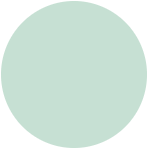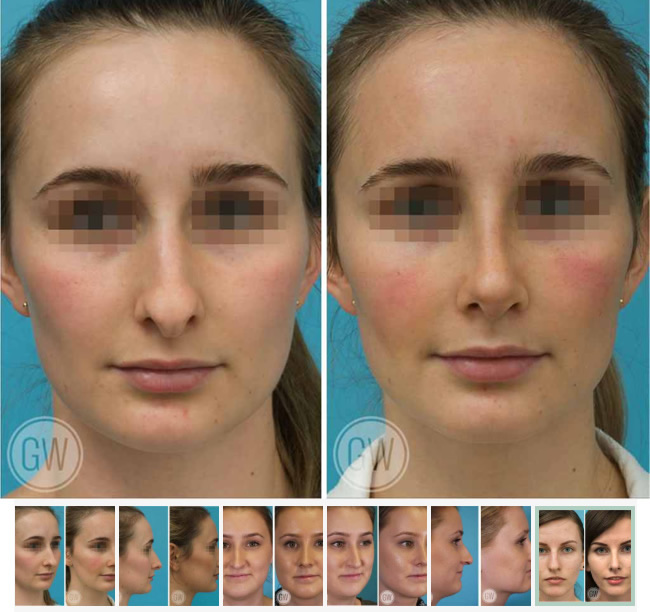Rhinoplasty (commonly referred as a nose job) is a surgical procedure designed to alter the shape or size of the nose to address facial harmony or functional concerns. Individuals may seek this procedure for various reasons, including structural issues that affect breathing, nasal asymmetry due to injury or congenital differences, or personal preferences regarding their facial proportions. In some cases, rhinoplasty is performed to refine the nose’s appearance in relation to other facial features. The procedure is tailored to each person’s unique anatomy, with the goal of achieving their desired result.
Considering Rhinoplasty?
Although rhinoplasty is a very popular cosmetic surgery procedure, it is not suitable for everyone. Anyone considering rhinoplasty surgery, needs to be physically and mentally healthy and should be realistic about the expected results. This applies to all plastic surgery procedures.
People considering changes to the shape or function of their nose, who have no underlying health concerns, may be suitable candidates for rhinoplasty or nasal surgery. Those seeking to adjust the overall size of their nose, reshape the tip, address a bump, straighten the bridge, modify the size of the nostrils, or address breathing difficulties may explore rhinoplasty as an option.
Photo disclaimer: Each surgical procedure produces unique outcomes influenced by factors such as body composition, skin tone, laxity, age, and genetics. The before-and-after photographs displayed are of actual patients and are provided for informational purposes only. These outcomes are specific to the individuals shown and may not be representative of all patients. Surgical procedures carry risks, and results may vary. A consultation with your surgeon will provide more personalised information about potential outcomes and risks.
Consultation
If you’re considering rhinoplasty, make an appointment for an initial consultation with Dr. Watts. Dr. Watts will conduct an assessment and examination of your nasal features and discuss how you feel they relate to the rest of your face.
During the consultation, Dr. Watts will explain in detail, the different aspects of rhinoplasty and nose surgery including, the likely outcome of your surgery, recovery time, potential risks, the cost, and whether you can receive a Medicare rebate for the procedure, anaesthesia and hospital time. Dr. Watts will be able to answer any questions that you have regarding rhinoplasty and nose surgery at his office in West Perth. Dr. Watts uses computer imaging technology to provide patients with an idea of the expected results.
Surgery
There are two types of rhinoplasty procedures; open and closed rhinoplasty. With closed rhinoplasty, all the incisions are made inside the nose. Scars from skin incisions will not be evident with closed rhinoplasty. With open rhinoplasty, also known as external rhinoplasty, a tiny incision is made on the skin between the nostrils (the columnella). In most cases, the scar from open rhinoplasty is expected to be a fine line that typically fades over time.
Rhinoplasty is usually performed under a general anaesthetic, although some nose surgery procedures may be performed under local anaesthetic. The entire process usually takes between two to three hours. Following the operation, a cast is placed on the patient’s nose and will usually be removed 10 days after surgery.
Recovery and Post-Operative Care
Most rhinoplasty patients report very little pain following the procedure. After undergoing rhinoplasty surgery, you will not be able to breathe through your nose for roughly 1 week due to swelling. The swelling around your nose will usually start to improve in one to two days following surgery. You may have minor swelling around the eyes for several weeks, however once the swelling settles the results of the nose surgery will become noticeable.
Post-operative care is very important after rhinoplasty surgery. You will be advised to avoid bending or lifting for at least three weeks as this can worsen the swelling. Activities such as weight lifting, aerobics, cycling and running are also inadvisable for the same time period. You should not engage in any contact sports for at least 3 months following the procedure. The bones and cartilage in your nose take time to heal properly and it is important to protect them during this period.
Although complications are rare, it’s important to know some of the risks associated with rhinoplasty, such as infections, bleeding and nasal obstruction. Dr. Watts will advise you appropriately on all the risks involved and how to minimise your chances of complications after your rhinoplasty surgery.
Call us on (08) 7220 9338 for a free phone consultation with our practice manager, or send us an enquiry via the contact page on this website.
PLEASE TAKE INTO CONSIDERATION
Any surgical or invasive procedure carries risks. Before proceeding, you should seek a second opinion from an appropriately qualified health practitioner.


